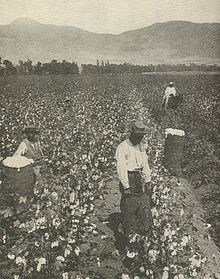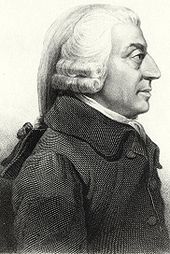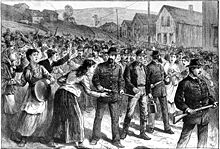The term "wage slavery" has been used to criticize exploitation of labour and social stratification,
with the former seen primarily as unequal bargaining power between
labor and capital (particularly when workers are paid comparatively low
wages, e.g. in sweatshops) and the latter as a lack of workers' self-management, fulfilling job choices and leisure in an economy. The criticism of social stratification covers a wider range of employment choices bound by the pressures of a hierarchical society to perform otherwise unfulfilling work that deprives humans of their "species character" not only under threat of starvation or poverty, but also of social stigma and status diminution.
Similarities between wage labor and slavery were noted as early as Cicero in Ancient Rome, such as in De Officiis. With the advent of the Industrial Revolution, thinkers such as Pierre-Joseph Proudhon and Karl Marx elaborated the comparison between wage labor and slavery, while Luddites emphasized the dehumanization brought about by machines. Before the American Civil War, Southern defenders of African American slavery invoked the concept of wage slavery to favorably compare the condition of their slaves to workers in the North. The United States abolished slavery after the Civil War, but labor union activists found the metaphor useful and appropriate. According to Lawrence Glickman, in the Gilded Age "[r]eferences abounded in the labor press, and it is hard to find a speech by a labor leader without the phrase".
The introduction of wage labor in 18th-century Britain was met with resistance, giving rise to the principles of syndicalism. Historically, some labor organizations and individual social activists have espoused workers' self-management or worker cooperatives as possible alternatives to wage labor.
Similarities between wage labor and slavery were noted as early as Cicero in Ancient Rome, such as in De Officiis. With the advent of the Industrial Revolution, thinkers such as Pierre-Joseph Proudhon and Karl Marx elaborated the comparison between wage labor and slavery, while Luddites emphasized the dehumanization brought about by machines. Before the American Civil War, Southern defenders of African American slavery invoked the concept of wage slavery to favorably compare the condition of their slaves to workers in the North. The United States abolished slavery after the Civil War, but labor union activists found the metaphor useful and appropriate. According to Lawrence Glickman, in the Gilded Age "[r]eferences abounded in the labor press, and it is hard to find a speech by a labor leader without the phrase".
The introduction of wage labor in 18th-century Britain was met with resistance, giving rise to the principles of syndicalism. Historically, some labor organizations and individual social activists have espoused workers' self-management or worker cooperatives as possible alternatives to wage labor.
History
Emma Goldman famously denounced wage slavery by saying: "The only difference is that you are hired slaves instead of block slaves"
The view that working for wages is akin to slavery dates back to the ancient world. In ancient Rome, Cicero wrote that "whoever gives his labor for money sells himself and puts himself in the rank of slaves".
In 1763, the French journalist Simon Linguet published an influential description of wage slavery:
The slave was precious to his master because of the money he had cost him ... They were worth at least as much as they could be sold for in the market ... It is the impossibility of living by any other means that compels our farm labourers to till the soil whose fruits they will not eat and our masons to construct buildings in which they will not live ... It is want that compels them to go down on their knees to the rich man in order to get from him permission to enrich him ... what effective gain [has] the suppression of slavery brought [him ?] He is free, you say. Ah! That is his misfortune ... These men ... [have] the most terrible, the most imperious of masters, that is, need. ... They must therefore find someone to hire them, or die of hunger. Is that to be free?
The view that wage work has substantial similarities with chattel slavery
was actively put forward in the late 18th and 19th centuries by
defenders of chattel slavery (most notably in the Southern states of the
United States) and by opponents of capitalism (who were also critics of
chattel slavery). Some defenders of slavery, mainly from the Southern slave states, argued that Northern workers were "free but in name – the slaves of endless toil" and that their slaves were better off.
This contention has been partly corroborated by some modern studies
that indicate slaves' material conditions in the 19th century were
"better than what was typically available to free urban laborers at the
time". In this period, Henry David Thoreau
wrote that "[i]t is hard to have a Southern overseer; it is worse to
have a Northern one; but worst of all when you are the slave-driver of
yourself".
Some abolitionists in the United States regarded the analogy as spurious. They believed that wage workers were "neither wronged nor oppressed". Abraham Lincoln and the Republicans
argued that the condition of wage workers was different from slavery as
laborers were likely to have the opportunity to work for themselves in
the future, achieving self-employment. The abolitionist and former slave Frederick Douglass initially declared "now I am my own master", upon taking a paying job.
However, later in life he concluded to the contrary, saying "experience
demonstrates that there may be a slavery of wages only a little less
galling and crushing in its effects than chattel slavery, and that this
slavery of wages must go down with the other".
Douglass went on to speak about these conditions as arising from the
unequal bargaining power between the ownership/capitalist class and the
non-ownership/laborer class within a compulsory monetary market: "No
more crafty and effective devise for defrauding the southern laborers
could be adopted than the one that substitutes orders upon shopkeepers
for currency in payment of wages. It has the merit of a show of honesty,
while it puts the laborer completely at the mercy of the land-owner and
the shopkeeper".
African American wage workers picking cotton on a plantation in the South
Self-employment became less common as the artisan tradition slowly disappeared in the later part of the 19th century. In 1869, The New York Times
described the system of wage labor as "a system of slavery as absolute
if not as degrading as that which lately prevailed at the South". E. P. Thompson
notes that for British workers at the end of the 18th and beginning of
the 19th centuries, the "gap in status between a 'servant,' a hired
wage-laborer subject to the orders and discipline of the master, and an
artisan, who might 'come and go' as he pleased, was wide enough for men
to shed blood rather than allow themselves to be pushed from one side to
the other. And, in the value system of the community, those who
resisted degradation were in the right".
A "Member of the Builders' Union" in the 1830s argued that the trade
unions "will not only strike for less work, and more wages, but will
ultimately abolish wages, become their own masters and work for each
other; labor and capital will no longer be separate but will be
indissolubly joined together in the hands of workmen and work-women". This perspective inspired the Grand National Consolidated Trades Union
of 1834 which had the "two-fold purpose of syndicalist unions – the
protection of the workers under the existing system and the formation of
the nuclei of the future society" when the unions "take over the whole
industry of the country". "Research has shown", summarises William Lazonick,
"that the 'free-born Englishman' of the eighteenth century – even those
who, by force of circumstance, had to submit to agricultural wage
labour – tenaciously resisted entry into the capitalist workshop".
The use of the term "wage slave" by labor organizations may originate from the labor protests of the Lowell Mill Girls in 1836.
The imagery of wage slavery was widely used by labor organizations
during the mid-19th century to object to the lack of workers'
self-management. However, it was gradually replaced by the more neutral
term "wage work" towards the end of the 19th century as labor
organizations shifted their focus to raising wages.
Karl Marx described capitalist society as infringing on individual autonomy
because it is based on a materialistic and commodified concept of the
body and its liberty (i.e. as something that is sold, rented, or alienated in a class society). According to Friedrich Engels:
The slave is sold once and for all; the proletarian must sell himself daily and hourly. The individual slave, property of one master, is assured an existence, however miserable it may be, because of the master's interest. The individual proletarian, property as it were of the entire bourgeois class which buys his labor only when someone has need of it, has no secure existence.
Similarities of wage work with slavery
Critics of wage work have drawn several similarities between wage work and slavery:
- Since the chattel slave is property, his value to an owner is in some ways higher than that of a worker who may quit, be fired or replaced. The chattel slave's owner has made a greater investment in terms of the money paid for the slave. For this reason, in times of recession chattel slaves could not be fired like wage laborers. A "wage slave" could also be harmed at no (or less) cost. American chattel-slaves in the 19th century had improved their standard of living from the 18th century and – according to historians Fogel and Engerman – plantation records show that slaves worked less, were better fed and whipped only occasionally – their material conditions in the 19th century being "better than what was typically available to free urban laborers at the time". This was partially due to slave psychological strategies under an economic system different from capitalist wage-slavery. According to Mark Michael Smith of the Economic History Society, "although intrusive and oppressive, paternalism, the way masters employed it, and the methods slaves used to manipulate it, rendered slaveholders' attempts to institute capitalistic work regimens on their plantation ineffective and so allowed slaves to carve out a degree of autonomy".
- Unlike a chattel slave, a wage laborer can (barring unemployment or lack of job offers) choose between employers, but those employers usually constitute a minority of owners in the population for which the wage laborer must work while attempts to implement workers' control on employers' businesses may be considered an act of theft or insubordination and thus be met with violence, imprisonment or other legal and social measures. The wage laborer's starkest choice is to work for an employer or to face poverty or starvation. If a chattel slave refuses to work, a number of punishments are also available; from beatings to food deprivation – although economically rational slave-owners practiced positive reinforcement to achieve best results and before losing their investment by killing an expensive slave.
- Historically, the range of occupations and status positions held by chattel slaves has been nearly as broad as that held by free persons, indicating some similarities between chattel slavery and wage slavery as well.
- Like chattel slavery, wage slavery does not stem from some immutable "human nature", but represents a "specific response to material and historical conditions" that "reproduce[s] the inhabitants, the social relations… the ideas… [and] the social form of daily life".
- Similarities became blurred when proponents of wage labor won the American Civil War of 1861-1865, in which they competed for legitimacy with defenders of chattel slavery. Each side presented an over-positive assessment of their own system while denigrating the opponent.
According to American anarcho-syndicalist philosopher Noam Chomsky, workers themselves noticed the similarities between chattel and wage slavery. Chomsky noted that the 19th-century Lowell Mill Girls, without any reported knowledge of European Marxism or anarchism,
condemned the "degradation and subordination" of the newly-emerging
industrial system and the "new spirit of the age: gain wealth,
forgetting all but self", maintaining that "those who work in the mills
should own them". They expressed their concerns in a protest song during their 1836 strike:
Oh! isn't it a pity, such a pretty girl as I
Should be sent to the factory to pine away and die?
Oh! I cannot be a slave, I will not be a slave,
For I'm so fond of liberty,
That I cannot be a slave.
Should be sent to the factory to pine away and die?
Oh! I cannot be a slave, I will not be a slave,
For I'm so fond of liberty,
That I cannot be a slave.
Defenses of both wage labor and chattel slavery in the literature
have linked the subjection of man to man with the subjection of man to nature – arguing that hierarchy and a social system's particular relations of production represent human nature and are no more coercive than the reality of life itself. According to this narrative, any well-intentioned attempt to fundamentally change the status quo is naively utopian and will result in more oppressive conditions. Bosses in both of these long-lasting systems argued that their respective systems created a lot of wealth and prosperity.
In some sense, both did create jobs, and their investment entailed
risk. For example, slave-owners risked losing money by buying chattel
slaves who later became ill or died; while bosses risked losing money by
hiring workers (wage slaves) to make products that did not sell well on
the market. Marginally, both chattel and wage slaves may become bosses;
sometimes by working hard. The "rags to riches" story occasionally
comes to pass in capitalism; the "slave to master" story occurred in
places like colonial Brazil, where slaves could buy their own freedom
and become business owners, self-employed, or slave-owners themselves. Thus critics of the concept of wage slavery do not regard social mobility, or the hard work and risk that it may entail, as a redeeming factor.
Anthropologist David Graeber
has noted that historically the first wage-labor contracts we know
about – whether in ancient Greece or Rome, or in the Malay or Swahili city-states
in the Indian Ocean – were in fact contracts for the rental of chattel
slaves (usually the owner would receive a share of the money and the
slaves another, with which to maintain their living expenses). According
to Graeber, such arrangements were quite common in New World slavery as well, whether in the United States or in Brazil. C. L. R. James (1901-1989) argued that most of the techniques of human organization employed on factory workers during the Industrial Revolution first developed on slave plantations.
Subsequent work "traces the innovations of modern management to the slave plantation".
Decline in use of term
By the end of the 19th century, both the use of the term wage slavery and its meaning declined
The usage of the term "wage slavery" shifted to "wage work" at the end of the 19th century as groups like the Knights of Labor and American Federation of Labor
shifted to a more reformist, trade union ideology instead of worker's
self-management. Much of the decline was caused by the rapid increase in
manufacturing after the Industrial Revolution and the subsequent
dominance of wage labor as a result. Another factor was immigration and
demographic changes that led to ethnic tension between the workers.
As Hallgrimsdottir and Benoit point out:
[I]ncreased centralization of production ... declining wages ... [an] expanding ... labor pool ... intensifying competition, and ... [t]he loss of competence and independence experienced by skilled labor" meant that "a critique that referred to all [wage] work as slavery and avoided demands for wage concessions in favor of supporting the creation of the producerist republic (by diverting strike funds towards funding ... co-operatives, for example) was far less compelling than one that identified the specific conditions of slavery as low wages.
Treatment in various economic systems
Some anti-capitalist thinkers claim that the elite maintain wage slavery and a divided working class through their influence over the media and entertainment industry, educational institutions, unjust laws, nationalist and corporate propaganda, pressures and incentives to internalize values serviceable to the power structure, state violence, fear of unemployment,
and a historical legacy of exploitation and profit
accumulation/transfer under prior systems, which shaped the development
of economic theory. Adam Smith
noted that employers often conspire together to keep wages low and have
the upper hand in conflicts between workers and employers:
The interest of the dealers ... in any particular branch of trade or manufactures, is always in some respects different from, and even opposite to, that of the public... [They] have generally an interest to deceive and even to oppress the public ... We rarely hear, it has been said, of the combinations of masters, though frequently of those of workmen. But whoever imagines, upon this account, that masters rarely combine, is as ignorant of the world as of the subject. Masters are always and everywhere in a sort of tacit, but constant and uniform combination, not to raise the wages of labor above their actual rate ... It is not, however, difficult to foresee which of the two parties must, upon all ordinary occasions, have the advantage in the dispute, and force the other into a compliance with their terms.
Capitalism
The concept of wage slavery could conceivably be traced back to pre-capitalist figures like Gerrard Winstanley from the radical Christian Diggers movement in England, who wrote in his 1649 pamphlet, The New Law of Righteousness,
that there "shall be no buying or selling, no fairs nor markets, but
the whole earth shall be a common treasury for every man" and "there
shall be none Lord over others, but every one shall be a Lord of
himself".
Aristotle
stated that "the citizens must not live a mechanic or a mercantile life
(for such a life is ignoble and inimical to virtue), nor yet must those
who are to be citizens in the best state be tillers of the soil (for
leisure is needed both for the development of virtue and for active
participation in politics)", often paraphrased as "all paid jobs absorb and degrade the mind". Cicero
wrote in 44 BC that "vulgar are the means of livelihood of all hired
workmen whom we pay for mere manual labour, not for artistic skill; for
in their case the very wage they receive is a pledge of their slavery". Somewhat similar criticisms have also been expressed by some proponents of liberalism, like Silvio Gesell and Thomas Paine; Henry George, who inspired the economic philosophy known as Georgism; and the Distributist school of thought within the Catholic Church.
Pinkerton guards escort strikebreakers in Buchtel, Ohio, 1884
Red Army troops attack Kronstadt libertarian socialist
"wage slavery" critics who had demanded among other things that
"handicraft production be authorized provided it does not utilize wage
labour"
To Karl Marx and anarchist thinkers like Mikhail Bakunin and Peter Kropotkin, wage slavery was a class condition in place due to the existence of private property and the state. This class situation rested primarily on:
- The existence of property not intended for active use;
- The concentration of ownership in few hands;
- The lack of direct access by workers to the means of production and consumption goods; and
- The perpetuation of a reserve army of unemployed workers.
And secondarily on:
- The waste of workers' efforts and resources on producing useless luxuries;
- The waste of goods so that their price may remain high; and
- The waste of all those who sit between the producer and consumer, taking their own shares at each stage without actually contributing to the production of goods, i.e. the middle man.
Fascism
Fascist economic policies were more hostile to independent trade unions than modern economies in Europe or the United States.
Fascism was more widely accepted in the 1920s and 1930s, and foreign
corporate investment (notably from the United States) in Italy and
Germany increased after the fascists took power.
Fascism has been perceived by some notable critics, like Buenaventura Durruti, to be a last resort weapon of the privileged to ensure the maintenance of wage slavery:
No government fights fascism to destroy it. When the bourgeoisie sees that power is slipping out of its hands, it brings up fascism to hold onto their privileges.
Psychological effects
According to Noam Chomsky, analysis of the psychological implications of wage slavery goes back to the Enlightenment era. In his 1791 book The Limits of State Action, classical liberal thinker Wilhelm von Humboldt
explained how "whatever does not spring from a man's free choice, or is
only the result of instruction and guidance, does not enter into his
very nature; he does not perform it with truly human energies, but
merely with mechanical exactness" and so when the laborer works under
external control, "we may admire what he does, but we despise what he
is". Because they explore human authority and obedience, both the Milgram and Stanford experiments have been found useful in the psychological study of wage-based workplace relations.
Self-identity problems and stress
According to research, modern work provides people with a sense of personal and social identity that is tied to:
- The particular work role, even if unfulfilling; and
- The social role it entails e.g. family bread-winning, friendship forming and so on.
Thus job loss entails the loss of this identity.
Erich Fromm
argued that if a person perceives himself as being what he owns, then
when that person loses (or even thinks of losing) what he "owns" (e.g.
the good looks or sharp mind that allow him to sell his labor for high
wages) a fear of loss may create anxiety and authoritarian tendencies
because that person's sense of identity is threatened. In contrast, when
a person's sense of self is based on what he experiences in a state of
being (creativity, love, sadness, taste, sight and the like) with a less
materialistic regard for what he once had and lost, or may lose, then
less authoritarian tendencies prevail. In his view, the state of being
flourishes under a worker-managed workplace and economy, whereas
self-ownership entails a materialistic notion of self, created to
rationalize the lack of worker control that would allow for a state of
being.
Investigative journalist Robert Kuttner
analyzed the work of public-health scholars Jeffrey Johnson and Ellen
Hall about modern conditions of work and concludes that "to be in a life
situation where one experiences relentless demands by others, over
which one has relatively little control, is to be at risk of poor
health, physically as well as mentally". Under wage labor, "a relatively
small elite demands and gets empowerment, self-actualization, autonomy,
and other work satisfaction that partially compensate for long hours"
while "epidemiological data confirm that lower-paid, lower-status
workers are more likely to experience the most clinically damaging forms
of stress, in part because they have less control over their work".
Wage slavery and the educational system that precedes it "implies
power held by the leader. Without power the leader is inept. The
possession of power inevitably leads to corruption ... in spite of ...
good intentions ... [Leadership means] power of initiative, this sense
of responsibility, the self-respect which comes from expressed manhood,
is taken from the men, and consolidated in the leader. The sum of their
initiative, their responsibility, their self-respect becomes his ...
[and the] order and system he maintains is based upon the suppression of
the men, from being independent thinkers into being 'the men' ... In a
word, he is compelled to become an autocrat and a foe to democracy". For
the "leader", such marginalisation can be beneficial, for a leader
"sees no need for any high level of intelligence in the rank and file,
except to applaud his actions. Indeed such intelligence from his point
of view, by breeding criticism and opposition, is an obstacle and causes
confusion".
Wage slavery "implies erosion of the human personality ... [because]
some men submit to the will of others, arousing in these instincts which
predispose them to cruelty and indifference in the face of the
suffering of their fellows".
Psychological control
Higher wages
In
19th-century discussions of labor relations, it was normally assumed
that the threat of starvation forced those without property to work for
wages. Proponents of the view that modern forms of employment constitute
wage slavery, even when workers appear to have a range of available
alternatives, have attributed its perpetuation to a variety of social
factors that maintain the hegemony of the employer class.
In an account of the Lowell Mill Girls, Harriet Hanson Robinson wrote that generously high wages were offered to overcome the degrading nature of the work:
At the time the Lowell cotton mills were started the caste of the factory girl was the lowest among the employments of women. ... She was represented as subjected to influences that must destroy her purity and self respect. In the eyes of her overseer she was but a brute, a slave, to be beaten, pinched and pushed about. It was to overcome this prejudice that such high wages had been offered to women that they might be induced to become mill girls, in spite of the opprobrium that still clung to this degrading occupation.
In his book Disciplined Minds, Jeff Schmidt
points out that professionals are trusted to run organizations in the
interests of their employers. Because employers cannot be on hand to
manage every decision, professionals are trained to "ensure that each
and every detail of their work favors the right interests–or skewers the
disfavored ones" in the absence of overt control:
The resulting professional is an obedient thinker, an intellectual property whom employers can trust to experiment, theorize, innovate and create safely within the confines of an assigned ideology.
Parecon
(participatory economics) theory posits a social class "between labor
and capital" of higher paid professionals such as "doctors, lawyers,
engineers, managers and others" who monopolize empowering labor and
constitute a class above wage laborers who do mostly "obedient, rote
work".
Lower wages
The
terms "employee" or "worker" have often been replaced by "associate".
This plays up the allegedly voluntary nature of the interaction while
playing down the subordinate status of the wage laborer as well as the
worker-boss class distinction emphasized by labor movements. Billboards
as well as television, Internet and newspaper advertisements
consistently show low-wage workers with smiles on their faces, appearing
happy.
Job interviews and other data on requirements for lower skilled
workers in developed countries – particularly in the growing service
sector – indicate that the more workers depend on low wages and the less
skilled or desirable their job is, the more employers screen for
workers without better employment options and expect them to feign
unremunerative motivation.
Such screening and feigning may not only contribute to the positive
self-image of the employer as someone granting desirable employment, but
also signal wage-dependence by indicating the employee's willingness to
feign, which in turn may discourage the dissatisfaction normally
associated with job-switching or union activity.
At the same time, employers in the service industry have
justified unstable, part-time employment and low wages by playing down
the importance of service jobs for the lives of the wage laborers (e.g.
just temporary before finding something better, student summer jobs and
the like).
In the early 20th century, "scientific methods of strikebreaking" were devised – employing a variety of tactics that emphasized how strikes undermined "harmony" and "Americanism".
Workers' self-management
Noam Chomsky has written in support of labour movements
Some social activists objecting to the market system or price system of wage working historically have considered syndicalism, worker cooperatives, workers' self-management and workers' control as possible alternatives to the current wage system.
Labor and government
The American philosopher John Dewey
believed that until "industrial feudalism" is replaced by "industrial
democracy", politics will be "the shadow cast on society by big
business". Thomas Ferguson has postulated in his investment theory of party competition
that the undemocratic nature of economic institutions under capitalism
causes elections to become occasions when blocs of investors coalesce
and compete to control the state.
Noam Chomsky has argued that political theory tends to blur the 'elite' function of government:
Modern political theory stresses Madison's belief that "in a just and a free government the rights both of property and of persons ought to be effectually guarded." But in this case too it is useful to look at the doctrine more carefully. There are no rights of property, only rights to property that is, rights of persons with property,...
[In] representative democracy, as in, say, the United States or Great Britain […] there is a monopoly of power centralized in the state, and secondly – and critically – […] the representative democracy is limited to the political sphere and in no serious way encroaches on the economic sphere […] That is, as long as individuals are compelled to rent themselves on the market to those who are willing to hire them, as long as their role in production is simply that of ancillary tools, then there are striking elements of coercion and oppression that make talk of democracy very limited, if even meaningful.
In this regard, Chomsky has used Bakunin's theories about an "instinct for freedom", the militant history of labor movements, Kropotkin's mutual aid evolutionary principle of survival and Marc Hauser's theories supporting an innate and universal moral faculty, to explain the incompatibility of oppression with certain aspects of human nature.
Influence on environmental degradation
Loyola University philosophy professor John Clark and libertarian socialist philosopher Murray Bookchin
have criticized the system of wage labor for encouraging environmental
destruction, arguing that a self-managed industrial society would better
manage the environment. Like other anarchists,
they attribute much of the Industrial Revolution's pollution to the
"hierarchical" and "competitive" economic relations accompanying it.
Employment contracts
Some criticize wage slavery on strictly contractual grounds, e.g. David Ellerman and Carole Pateman, arguing that the employment contract
is a legal fiction in that it treats human beings juridically as mere
tools or inputs by abdicating responsibility and self-determination,
which the critics argue are inalienable. As Ellerman points out, "[t]he
employee is legally transformed from being a co-responsible partner to
being only an input supplier sharing no legal responsibility for either
the input liabilities [costs] or the produced outputs [revenue, profits]
of the employer's business". Such contracts are inherently invalid "since the person remain[s] a de facto
fully capacitated adult person with only the contractual role of a
non-person" as it is impossible to physically transfer
self-determination. As Pateman argues:
The contractarian argument is unassailable all the time it is accepted that abilities can 'acquire' an external relation to an individual, and can be treated as if they were property. To treat abilities in this manner is also implicitly to accept that the 'exchange' between employer and worker is like any other exchange of material property . . . The answer to the question of how property in the person can be contracted out is that no such procedure is possible. Labour power, capacities or services, cannot be separated from the person of the worker like pieces of property.
In a modern liberal capitalist society, the employment contract is
enforced while the enslavement contract is not; the former being
considered valid because of its consensual/non-coercive nature and the
latter being considered inherently invalid, consensual or not. The noted
economist Paul Samuelson described this discrepancy:
Since slavery was abolished, human earning power is forbidden by law to be capitalized. A man is not even free to sell himself; he must rent himself at a wage.
Some advocates of right-libertarianism, among them philosopher Robert Nozick,
address this inconsistency in modern societies arguing that a
consistently libertarian society would allow and regard as valid
consensual/non-coercive enslavement contracts, rejecting the notion of
inalienable rights:
The comparable question about an individual is whether a free system will allow him to sell himself into slavery. I believe that it would.
Others like Murray Rothbard allow for the possibility of debt slavery, asserting that a lifetime labour contract can be broken so long as the slave pays appropriate damages:
[I]f A has agreed to work for life for B in exchange for 10,000 grams of gold, he will have to return the proportionate amount of property if he terminates the arrangement and ceases to work.
Schools of economics
In the philosophy of mainstream, neoclassical economics, wage labor is seen as the voluntary sale of one's own time and efforts,
just like a carpenter would sell a chair, or a farmer would sell wheat.
It is considered neither an antagonistic nor abusive relationship and
carries no particular moral implications.
Austrian economics argues that a person is not "free" unless they can sell their labor because otherwise that person has no self-ownership and will be owned by a "third party" of individuals.
Post-Keynesian economics perceives wage slavery as resulting from inequality of bargaining power
between labor and capital, which exists when the economy does not
"allow labor to organize and form a strong countervailing force".
The two main forms of socialist economics perceive wage slavery differently:
- Libertarian socialism sees it as a lack of workers' self-management in the context of substituting state and capitalist control with political and economic decentralization and confederation.
- State socialists view it as an injustice perpetrated by capitalists and solved through nationalization and social ownership of the means of production.








